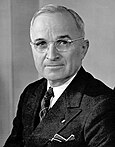Portal:United States/Selected biography/10
Harry S. Truman (May 8, 1884 – December 26, 1972) was the thirty-third President of the United States (1945–1953). As vice president, he succeeded to the office upon the death of Franklin D. Roosevelt.
During World War I he served as an artillery officer. After the war he became part of the political machine of Tom Pendergast and was elected a county judge in Missouri and eventually a United States Senator. In 1945, Roosevelt replaced Henry A. Wallace as vice president with Truman for Roosevelt's fourth term.
As president, Truman faced challenge after challenge in domestic affairs. The tumultuous reconversion of the economy of the United States was marked by severe shortages, numerous strikes, and the passage of the Taft–Hartley Act over his veto. He confounded all predictions to win re-election in 1948, largely due to his famous Whistle Stop Tour of rural America. After his re-election he was able to pass only one of the proposals in his Fair Deal program. He used executive orders to begin desegregation of the U.S. armed forces and to launch a system of loyalty checks to remove thousands of communist sympathizers from government office, even though he strongly opposed mandatory loyalty oaths for governmental employees, a stance that led to charges that his administration was soft on communism. Truman's presidency was also eventful in foreign affairs, with the end of World War II and his decision to use nuclear weapons in combat, the founding of the United Nations, the Marshall Plan to rebuild Europe, the Truman Doctrine to contain communism, the beginning of the Cold War, the creation of NATO, and the Korean War. Corruption in Truman's administration reached the cabinet and senior White House staff. Republicans made corruption a central issue in the 1952 campaign.

